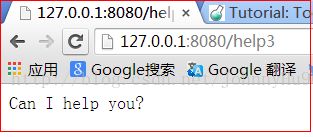Bottle实例Todo-List—返回静态文件和json对象
代码如下:
Python Code
|
1
2 3 4 5 6 7 8 9 10 11 12 13 14 15 16 17 18 19 20 21 22 23 24 25 26 27 |
# -*- coding: utf-8 -*- #!/usr/bin/python # filename: todo.py # codedtime: 2014-8-28 20:50:44 import sqlite3 import bottle @bottle.route( '/help3') def help(): return bottle.static_file( 'help.html', root= '.') #静态文件 @bottle.route( '/json:json#[0-9]+#') def show_json(json): conn = sqlite3.connect( 'todo.db') c = conn.cursor() c.execute( "SELECT task FROM todo WHERE id LIKE ?", (json)) result = c.fetchall() c. close() if not result: return { 'task': 'This item number does not exist!'} else: return { 'Task': result[ 0]} #返回Json对象 bottle.debug( True) bottle.run(host= '127.0.0.1', port= 8080, reloader = True) |
结果如下:
其中的 root='.')或 root='./')表示在程序当前目录下,当然你也可以知道其他的路径如: root='/path/to/file'
第二个路由@bottle.route('/json:json#[0-9]+#')返回一个Json对象,在浏览器中输入:http://127.0.0.1:8080/json4
结果如下:
Web程序难免会遇到访问失败的错误,那么怎样去捕获这些错误,Bottle可以用路由机制来捕捉错误,如下捕获403、404:
|
1
2 3 4 5 6 7 |
@error( 403)
def mistake403(code): return 'The parameter you passed has the wrong format!' @error( 404) def mistake404(code): return 'Sorry, this page does not exist!' |

